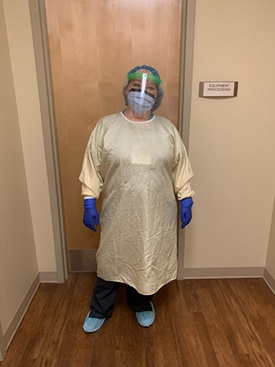 Last week, we shared with you a story about Heather Walker, a certified nursing assistant at Wilkes Medical Center. She provided her thoughts on COVID-19 as a health care worker on the front lines of this pandemic.
Last week, we shared with you a story about Heather Walker, a certified nursing assistant at Wilkes Medical Center. She provided her thoughts on COVID-19 as a health care worker on the front lines of this pandemic.Today, Alisha Kircheis, a respiratory therapist at Wilkes Medical Center gives her perspective.
A typical work day for a respiratory therapist at a hospital is very busy and fast-paced. “You need the ability to treat many patients and make clinical decisions in seconds based on each patient’s individual needs,” she said. “We go from giving breathing treatments to pediatric patients in the emergency department to running a ventilator for an adult. We see patients of all ages from all walks of life.”
Kircheis said some days can be incredibly stressful. “I like to think of it as a service I’m offering to others to give them the best chance possible. My way of relieving stress is knowing that I’m helping someone to live and see another day with their family. All of my colleagues are very helpful and supportive and we remind each other every day that we couldn’t do it without each other.”
As a front-line health care worker, she takes many precautions to keep her children and herself safe, including never going out without wearing a mask and carrying hand sanitizer. “We always wash our hands before eating and make sure we stay a good distance away from others,” she said. “I don’t take my children into public spaces unless it’s absolutely necessary so we have spent more time lately cooking together at home as a family.”
The most difficult part, she said, is watching a patient’s condition worsen and “knowing that you did everything you could to save them but it just didn’t make a difference. You feel so sad for them and their families.”
However, “the most rewarding part is when a patient goes from extreme numbers of oxygen to a ventilator and then back home when they’re healthy,” Kircheis said. “It makes what I do worthwhile and I love to see the smiles on their faces when we remove their ET tube (an endotracheal tube that helps a patient breathe) and they say ‘Thank you.’”
Kircheis is understandably worried about contracting COVID-19 and giving it to a loved one. “I take extra care to ensure I follow all of the guidelines both inside and outside of work,” she said.
For people who still are not taking this pandemic seriously, she had this message: “Regardless of how you feel about it, COVID-19 is a very real disease to those who have lost their lives or family members. Even if you believe you are immune to the dangers, chances are someone you love or care for is not.”
“I have held the hands of COVID-positive patients of all ages and they all felt equally as horrible. It’s very simple to keep those who you love safe. Wear your mask, wash your hands and keep your distance from those who don’t live with you. Those three very simple measures can save hundreds of lives. Please do your part to keep those around you, and those you love, safe and healthy.”
